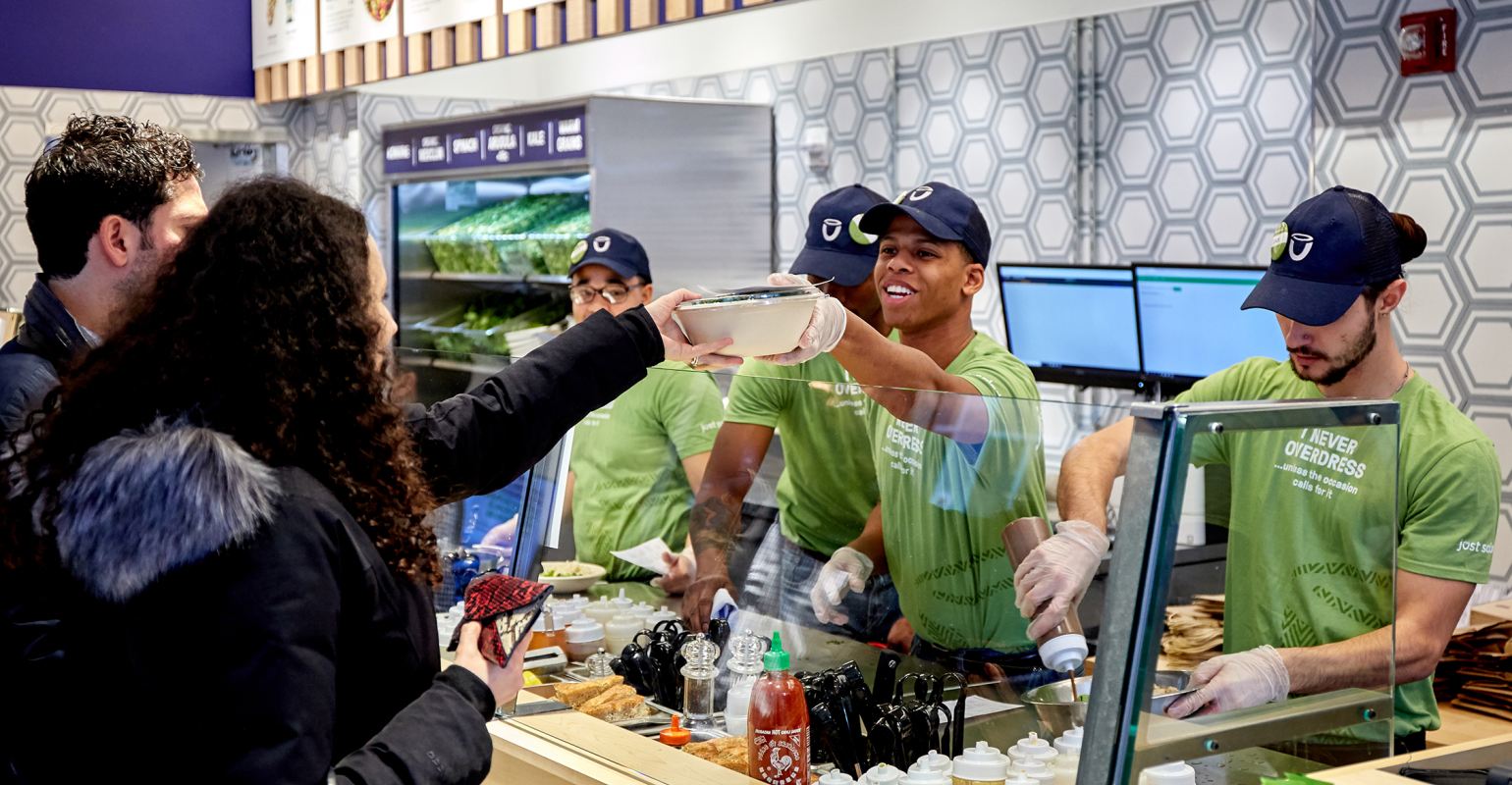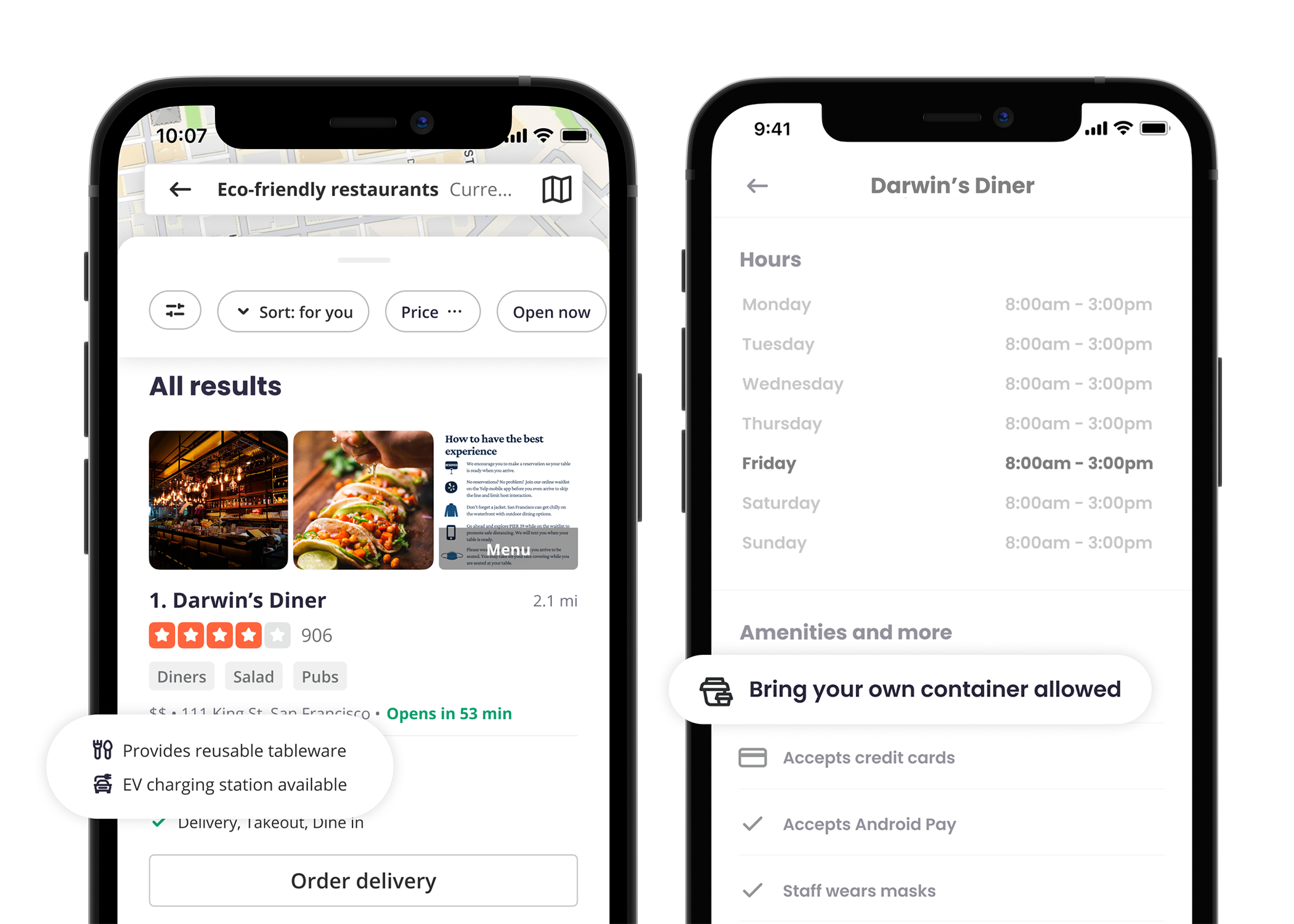April 22 marks the 52nd annual Earth Day, a global holiday of sorts devoted to education about the environment — and taking action.
At the first Earth Day in 1970, people gathered at rallies across the country — in the style of Vietnam War protest-era “teach-ins” — to hear the likes of actor Paul Newman and folk singer Pete Seeger share their hopes for a cleaner world. The movement went global and now more than 190 countries participate.
For restaurants, Earth Day has become part marketing opportunity — often overshadowed by the newer 4/20 “holiday.” But it’s also a day to take stock, particularly for companies that have set sustainability goals to ease their impact on the planet.
The need for restaurant companies to take action is more urgent than ever before.
Earlier this month, a report by the United Nation’s Intergovernmental Panel on Climate Change, or IPCC, warned that nations need to move away from fossil fuels faster to limit global warming to 1.5 degrees Celsius — and hopefully to avoid worsening floods, droughts, wildfires and worse.
The report found that efforts to reduce greenhouse gas emissions are working. But they aren’t being implemented fast enough.
Policies and laws are enhancing energy efficiency, reducing deforestation and accelerating the use of renewable energy, but these efforts need to be scaled up and applied more widely for the world to halve emissions by 2030, as is the goal, and reach net-zero by 2050.
“We are at a crossroads,” said IPCC chair Hoesung Lee. “The decisions we make now can secure a liveable future. “We have the tools and know-how required to limit warming.”
And consumers are watching.
In a study out this week by management consulting firm Kearney, consumers are increasingly making mindful food purchases based on their impact on climate and the environment, a trend the report calls “Climavorism.”
“We are entering into a new era of climate-conscious eating, giving rise to the Climavores — with 80% of consumers indicating at least some awareness of the connection between food choice and the environment,” said Corey Chafin, associate partner in Kearney’s consumer practice and the report’s principal author.
Read on to learn more about what those Climavores are looking for in restaurants, and how some restaurant companies are being more transparent about their climate-impact journey.
SEC proposes climate-related disclosure mandate
In March, the Securities and Exchange Commission proposed a rule change that would require public companies to report certain risks related to climate, including the greenhouse gas emissions they produce and other metrics related to their impact on the planet.
SEC Chair Gary Gensler said in a statement the rules change, if adopted, would provide investors with “decision-useful” information, and it would create a consistent and clear reporting obligation for public companies.
Gensler argued that investors are already looking for information about climate impact, and many companies already disclose this information in various ways. The rule would be designed to make such disclosures consistent and comparable.
“Today, investors representing literally tens of trillions of dollars support climate-related disclosures because they recognize that climate risks can pose significant financial risks to companies, and investors need reliable information about climate risks to make informed investment decisions,” he said in a statement.
The rule change is open for public comment. One opposing opinion has already been publicly stated by SEC commissioner Hester Peirce (at great length).
Others, like Danielle Fugere, president of the environmental advocacy group As You Sow, argue that better reporting on greenhouse gas emissions is vital for investors to assess which companies are aligned with Paris Agreement targets — and minimizing climate change risk — and which are failing to prepare for the catastrophic impact of an overheating planet.
Last year, several public restaurant companies announced new science-based targets for reducing emissions to limit global warming to less than 1.5 degrees Celsius, including McDonald’s, Yum Brands Inc., Chipotle Mexican Grill, and Restaurant Brands International, using similar metrics based on a United Nation’s campaign to reach net-zero emissions by 2050.
On Friday — Earth Day — The Cheesecake Factory Inc. joined those large chains, announcing that it has started the process of creating a climate change strategy in line with the Science Based Targets Initiative, or SBTi. The company will submit goals for validation and publish progress on its website and in an annual Corporate Social Responsibility report.
Also like several of its peers, The Cheesecake Factory Inc. has tied a portion of executive bonus compensation to its sustainable sourcing policy and climate commitments.
“Over the last decade, we established a dedicated sustainability department which has been focused on creating and implementing operational programs and an overarching sustainability strategy,” said David Gordon, Cheesecake Factory president, in a statement. “We are very pleased to be committing to reduce our carbon emissions as part of that strategy.”

Just Salad was one of the first more than a decade ago to pioneer use of a reusable salad bowl to reduce waste.
Just Salad sets new bar for sustainability standards
New York-based Just Salad’s latest Annual Impact Report was released earlier this month with a number of new goals embedded into operations.
The more than 50-unit chain was one of the first more than a decade ago to pioneer use of a reusable salad bowl to reduce waste. Since then, the chain has gone way beyond the bowl, now focusing also on carbon reduction efforts and other packaging pollution solutions.
This year, for example, Just Salad announced a partnership with Planet FWD, a carbon-management platform that provides third-party-verified emissions estimates for each item on the chain’s menu, helping consumers make better choices. Just Salad has also developed a Climatarian menu featuring its lowest-carbon options.
In addition, for the first time, Just Salad completed a greenhouse gas emissions inventory, conducted by Green Places, which looked at operations across the board. Among the highlights in 2021, for example, the chain reduced its average annual energy use by 7% through a pilot program with Budderfly.
Just Salad saved 8,400 meals from going to waste and avoided 36 tonnes of greenhouse gas emissions by donating surplus food to Good to Go. And the chain achieved its goal of sourcing 100% of eggs from hens raised cage free.
And, of course, Just Salad remains a leader on the packaging front, with 91% of foodservice packaging made from recycled and/or renewable materials, and 90% was recyclable, reusable and/or compostable.
In addition to offering reusable bowls and cups, Just Salad offers reusable containers for pickup and delivery orders on DoorDash and Caviar through a partnership with Deliver Zero. Guests can use non-disposable bowls at some dine-in locations, and customers can decline disposable utensils when ordering through the brand’s app.
“The time has come for radical solutions — to the never-ending stream of single-use waste; to the lack of transparency about the environmental impacts of our food and packaging choices; to the systemic obstacles to reducing food waste, and so much more,” said Sandra Noonan, Just Salad’s chief sustainability officer, in a statement.

This month, Yelp added a new feature to help consumers find businesses that have certain eco-friendly practices.
Yelp helps consumers find eco-friendly businesses
In recent years, Yelp has added search options to help consumers find businesses that align with their priorities and values. This month, the platform added a new feature to help consumers find businesses that have certain eco-friendly practices.
The attributes business owners can now display on their Yelp Page includes things like whether they offer electric vehicle charging stations, their use of plastic-free packaging, reusable tableware, a bring-your-own-container option and use of compostable packaging.
Yelp has also launched a Sustainability Resource Hub for businesses to learn how to make better choices, from sourcing from local producers to eliminating single-use plastics.
Yelp worked with a number of environmental advocacy groups, which are also great resources for businesses looking to soften their impact on the planet, including Plastic Pollution Coalition, Surfrider Foundation, Upstream, ReThink Disposable (Clean Water Fund), Reusable LA and others.
UPDATE: This article has been updated with new information from The Cheesecake Factory.
Contact Lisa Jennings at [email protected]
Follow her on Twitter: @livetodineout





